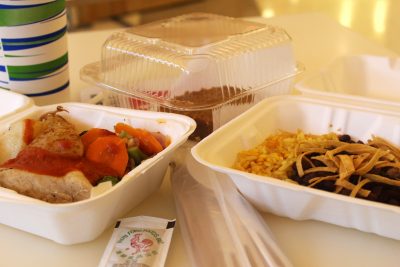
In the wake of pandemic-related safety measures within dining halls, Boston University faces roadblocks in its progress toward its Zero Waste objective.
BU Dining Services has implemented a slew of changes to dining halls this semester to prevent potential spread of COVID-19 by limiting shared silverware and spaces.
Students can also order meals online for contactless pickup through Rhetty-To-Go meals on the BU Dining Services website.
Meals are packaged in to-go containers to allow students to dine anywhere on campus while adhering to physical distancing protocols, BU Dining Services Marketing Director James Boushka wrote in an email.
Students are encouraged to dispose of these containers appropriately by rinsing and drying them before sorting them into recycling or trash bins for proper disposal, according to BU Dining’s guide on Waste Reduction and Diversion.
Lexie Raczka, sustainability director at BU Dining Services, wrote in an email that while all meals are packaged in containers made of either plant-based or recyclable materials, the plant material renders some unrecyclable.
“Many containers including fiber and [Polylactic Acid] clamshells, paper soup bowls, PLA and bamboo cups and PLA lids are made of plant-based materials and are incidentally accepted in the food waste stream,” Raczka wrote. “Some packaging is recyclable, though, namely the aluminum containers and their corresponding plastic lids.”
Raczka later wrote in a follow-up email that the dining halls can spray and rinse containers placed on their conveyor belt trash receptacles so that they can be recycled.
Many containers used in the dining halls are compostable, but this does not mean the University offers composting sites to students.
“We choose [to] use compostable products not because they are composted in our waste stream,” Raczka wrote in another email, “but because they possess other environmental and public health attributes, including that they are not a petroleum-based product and can be better than petroleum-based products for public health when they are incinerated.”
Nonetheless, Raczka wrote that the BU community should dispose of these containers in food waste receptacles, which allows for Dining Services to better capture the food waste left over in compostable containers.
Students can work on their own sustainability practices to help minimize waste, Raczka wrote.
“Through repetition, practices like [bringing] a reusable bag, using a cloth napkin, or not taking a straw can become second nature,” Raczka wrote. “One of the most common dining hall habits that prevents achieving a zero waste objective is students taking more food than they are able to or intend on eating.”
Lisa Tornatore, sustainability@BU director, wrote in an email that the University continues to strive toward its Zero Waste initiative and carbon neutrality, which BU would like to reach by 2030 and 2040, respectively.
With the onset of the pandemic, waste has increased due to the single-use nature of many items, Tornatore wrote. She added that students looking to contribute to the goal of Zero Waste should be aware of their own habits and work toward reducing waste.
“As always, reducing the amount you consume is the most powerful act in a culture that pushes us to buy more than we need,” Tornatore wrote.
She added that sustainability@BU is working with Facilities Management and Operations to introduce food waste receptacles to Warren Towers residential floors.





























































































































